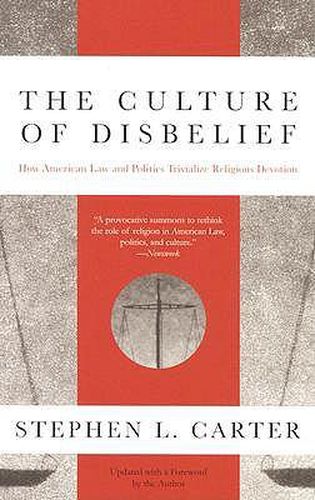Readings Newsletter
Become a Readings Member to make your shopping experience even easier.
Sign in or sign up for free!
You’re not far away from qualifying for FREE standard shipping within Australia
You’ve qualified for FREE standard shipping within Australia
The cart is loading…






The Culture Of Disbelief has been the subject of an enormous amount of media attention from the first moment it was published. Hugely successful in hardcover, the Anchor paperback is sure to find a large audience as the ever-increasing, enduring debate about the relationship of church and state in America continues. In The Culture Of Disbelief, Stephen Carter explains how we can preserve the vital separation of church and state while embracing rather than trivializing the faith of millions of citizens or treating religious believers with disdain. What makes Carter’s work so intriguing is that he uses liberal means to arrive at what are often considered conservative ends. Explaining how preserving a special role for religious communities can strengthen our democracy, The Culture Of Disbelief recovers the long tradition of liberal religious witness (for example, the antislavery, antisegregation, and Vietnam-era antiwar movements). Carter argues that the problem with the 1992 Republican convention was not the fact of open religious advocacy, but the political positions being advocated.
$9.00 standard shipping within Australia
FREE standard shipping within Australia for orders over $100.00
Express & International shipping calculated at checkout
Stock availability can be subject to change without notice. We recommend calling the shop or contacting our online team to check availability of low stock items. Please see our Shopping Online page for more details.
The Culture Of Disbelief has been the subject of an enormous amount of media attention from the first moment it was published. Hugely successful in hardcover, the Anchor paperback is sure to find a large audience as the ever-increasing, enduring debate about the relationship of church and state in America continues. In The Culture Of Disbelief, Stephen Carter explains how we can preserve the vital separation of church and state while embracing rather than trivializing the faith of millions of citizens or treating religious believers with disdain. What makes Carter’s work so intriguing is that he uses liberal means to arrive at what are often considered conservative ends. Explaining how preserving a special role for religious communities can strengthen our democracy, The Culture Of Disbelief recovers the long tradition of liberal religious witness (for example, the antislavery, antisegregation, and Vietnam-era antiwar movements). Carter argues that the problem with the 1992 Republican convention was not the fact of open religious advocacy, but the political positions being advocated.